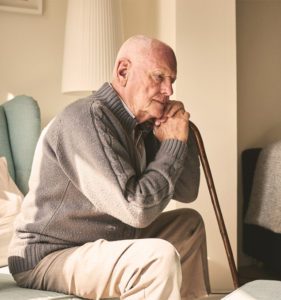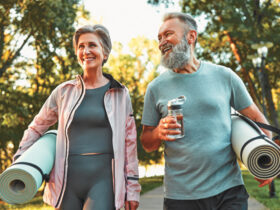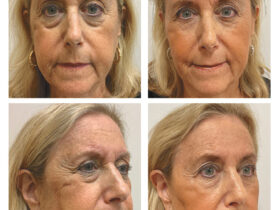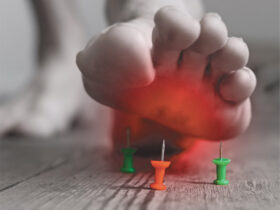 One-third of seniors age 65+ experience an accidental fall each year, and fall-related mortality is on the rise. It’s no wonder that heightened fall risk leads to fractures, fear of falling, loss of confidence, and subsequent self-restricted activities. Medicare and the American Geriatrics Society (AGS) recommend that clinicians include fall risk assessment as part of every annual geriatric wellness exam. The AGS calls for a few questions from the doctor about falls, gait, and balance in the previous year as well as a functional test such as the Timed Up and Go Test (TUGT). However, many researchers suggest this is not the best approach.
One-third of seniors age 65+ experience an accidental fall each year, and fall-related mortality is on the rise. It’s no wonder that heightened fall risk leads to fractures, fear of falling, loss of confidence, and subsequent self-restricted activities. Medicare and the American Geriatrics Society (AGS) recommend that clinicians include fall risk assessment as part of every annual geriatric wellness exam. The AGS calls for a few questions from the doctor about falls, gait, and balance in the previous year as well as a functional test such as the Timed Up and Go Test (TUGT). However, many researchers suggest this is not the best approach.
A recent entry in this debate is the work of Pierpaolo Palumbo and colleagues who assessed the accuracy of multiple established tools and some more recent, more involved assessment tools. They conclude that assessments containing less than 20 questions are less accurate than assessments containing 20 to 30 assessment parameters. One of the assessment tools they deemed most accurate can be used online, for free, at ffrat.farseeingresearch.eu. While increased accuracy is the advantage of the FRAT-up assessment tool available here, the disadvantages are the need for clinician orientation, the need to conduct this test online because of the complicated math generating the fall-risk probabilities, and the presence of up to 28 questions that must be asked by office staff.
On the other end of the spectrum, we have the work of Laura Vicaro and colleagues whose research suggests an abbreviated approach to fall-risk screening. It is likely that fall-risk screening has not been made a routine part of geriatric exams in an important percentage of clinical practices and that the time requirements for such screening is an inhibiting factor. In such cases, finding more efficient procedures would make sense. Vicaro and colleagues showed that, among patients with a history of falls, the TUGT and simple gait speed both predict fall risk with adequate reliability and equivalent predictive validity. A simple gait speed of 0.6 to 1.0 meters per second correlates with a 51% increased likelihood of a fall over the next year, and a gait speed of 0.6 m/s or less correlates with a 145% greater likelihood of a fall (38% vs. 93%). A gait speed assessment could be implemented by staff while they escort senior patients to the exam room.
Data from fall risk assessments can inform care planning. Patients with a high risk of falls generally qualify for physical therapy and other skilled intervention. A TUGT score of 14 seconds or greater correlates with a high fall risk. A TUGT score of 30 seconds or greater has long been considered a sign of functional dependence – meaning the patient should not go outside alone. A history of falls and/or a slow score on one of these assessments suggests a referral for functional assistance / personal care. Personal care often does not require institutionalization. For many elderly patients, in-home aide & nursing services can provide the assistance needed to keep patients healthy and safe. Clinicians can refer these patients to McKenney Home Care for a free in-home nursing assessment to determine the appropriateness of in-home personal care versus institutionalization.
McKenney Home Care in Naples, FL hosts a Lewy Body Dementia Support Group the first Wednesday of every month in Naples. This is an ongoing support group approved by the Lewy Body Dementia Association in Atlanta in affiliation with the Parkinson’s Association of SWFL and the Alzheimer’s Support Network.
McKenney Home Care provides exceptional in-home health services and client-centered care. With a passion for maximizing the quality of life of their clients and families, they are driven to ensure social engagement and specialty services during all stages of life.
For individuals with neurodegenerative disorders, McKenney Home Care delivers enriched specialized training for its caregivers working with Dementia Patients. In addition to specialized videos and manuals, McKenney educates the caregivers through the use of a Virtual Alzheimer’s App. This virtual reality experience helps caregivers understand the feelings and experiences of those suffering from Alzheimer’s and other forms of Dementia.
If you or someone you know would like more information about McKenney Home Care or the LBD Support Group, please call McKenney Home Care at 239-325-2273 or visit mckenneyhomecare.com
McKenney Home Care
CALL US TODAY!
239-325-CARE (2273)
9655 Tamiami Trail North #201
Naples, FL 34108









